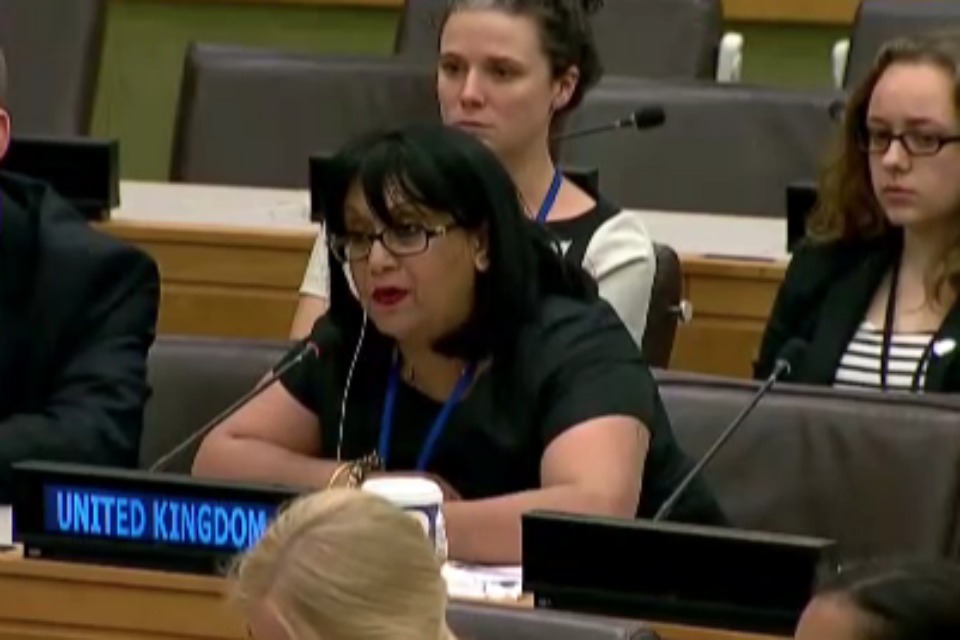"10 million new births registered means an additional 10 million children relying on UNICEF. UNICEF cannot and must not lose momentum."
Statement by Baroness Verma, Parliamentary Under Secretary of State for International Development, to the UNICEF Executive Board Annual Session

Thank you Mr President, Mr Executive Director for your statements.
The results of this year’s report are impressive and I congratulate you and the entire organisation on your commendable, important work. This year, UNICEF registered 10 million new births worldwide. They vaccinated 55 million children for DPT3, and, thanks to UNICEF, 40 million people now have access to improved drinking water; that’s equivalent to providing improved drinking water to half the population of Germany, or vaccinating the whole of Tanzania. That’s impressive.
But let’s not infer that UNICEF’s work is confined to those in need in narrow corners of the developing world. This year, UNICEF has focused its efforts on climate change, one of the biggest threats to all of our futures. Signing the Paris Agreement in December last year marked a pivotal moment, and now the time has come to translate these words into action. We welcome UNICEF’s leadership in this area on how to embed climate change resilience into both humanitarian and development programming.
We also thank UNICEF for their central role in establishing the ‘Education Cannot Wait’ Fund, which launched at this year’s World Humanitarian Summit in Istanbul. This new fund will provide education in emergencies and protracted crises, so that innocent children caught in conflict are not deprived of their right to learn and achieve a better future. 90 million US dollars have already been raised and the UK looks forward to working with UNICEF to increase the fund and delivery on the ground.
But 10 million new births registered means an additional 10 million children relying on UNICEF for protection against conflict and disease. It means 10 million more educations to provide. 10 million more vaccinations. So UNICEF cannot and must not lose momentum.
This week I am here to attend the Conference of States Parties to the Convention on the Right of Persons with Disabilities. People with disabilities across the globe still face unacceptable stigma and discrimination in their everyday lives. Many have not benefited from the progress of international development efforts and continue to live in poverty. This has to change. And UNICEF has a key role in ensuring that change for children with disabilities - in leaving no child behind. And as well as delivering for children with disabilities UNICEF also has a key role to play in inspiring the rest of the UN to follow suit. There is a long way to go to ensure all UN programmes are inclusive of people with disabilities.
We must also maintain our strong position on combating FGM and child marriage. The UNFPA – UNICEF Joint Programmes to end female genital mutilation and child, early and forced marriage must demonstrate their results and evidence of impact and cost-effectiveness better. We also ask for greater transparency in financial reporting; in this programme and more broadly by UNICEF and the whole UN system. This, and robust management of financial risk, is critical to offer greater assurances that investment reaches those it is meant for.
To deliver on these reform objectives, we count on UNICEF to play an active role, working in collaboration with agencies across the UN system. This is necessary for the UN system to function as the modern global organisation it needs to be, showing evidence that it can deliver on a rapidly shifting global agenda, achieving real efficiencies.
With others, UNICEF should work as an accountable, transparent and results-focused organisation. It should lead the way on ensuring no one is left behind and putting children at the heart of what it does. It should play a leadership role in inspiring and leading the way for the rights of persons with disabilities across the UN. It should deliver a step change in the UN’s work in fragile and conflict affected states, protracted crises and in humanitarian settings. And it should use, and support countries to use, evidence and data for decision-making.
The UK acknowledges and praises UNICEF’s work. We also urge UNICEF not to rest on its laurels. Progress on UN reform and continued review of UNICEF’s own organisational architecture to support ever more effective delivery are crucially important. After all, this year alone there will be another 10 million reasons why that matters.
Thank you.